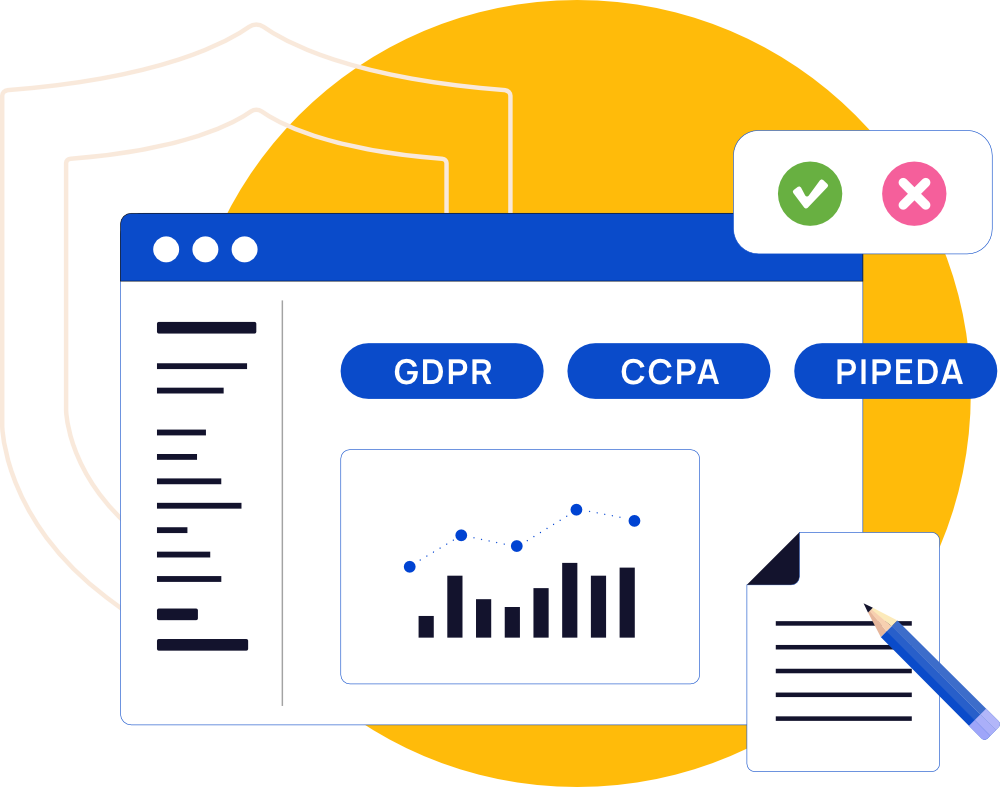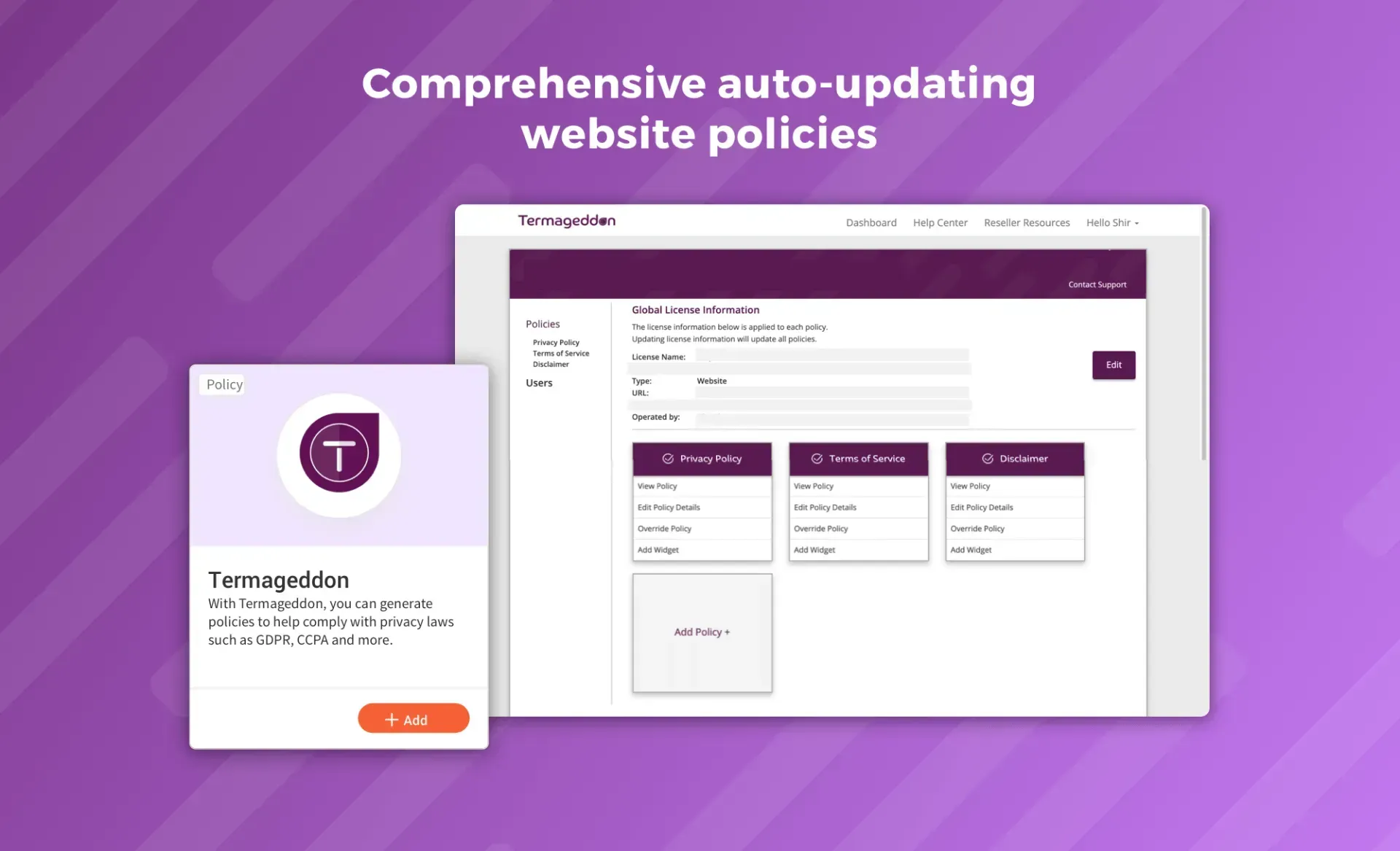
Ensuring Digital Responsibility: The Mandate of Website Compliance and online accessibility standards
In the current digital landscape, ensuring your website adheres to key legislation is not merely a recommended best practice—it is a mandatory legal obligation for businesses globally. The regulatory environment, spanning from data privacy policies (like GDPR and CCPA) to the core requirements of ada compliance for websites and WCAG, is complex and constantly evolving. Upholding compliance is essential, as it protects businesses from significant legal liabilities, cultivates user trust, and champions broader accessibility. Neglecting these responsibilities can result in substantial fines, reputational harm, and serious legal repercussions.
The Critical Impact of Non-Compliance
Ignoring compliance is no longer a viable option. Regulatory frameworks are rapidly strengthening, and the risks associated with non-adherence are too severe to dismiss. We have seen the real-world impact through enforcement actions, such as the numerous complaints and monumental fines issued under regulations like the GDPR.
The stakes are higher than ever. GDPR, for instance, sets a rigorous new standard for organizations handling the personal data of individuals within the European Union. This regulation was designed to place control of personal information firmly in the hands of EU citizens, while harmonizing previous, fragmented data protection laws. If your business processes data belonging to European citizens—regardless of where you operate—you are obligated to implement robust data protection procedures.
Key Compliance Considerations:
- Data Minimization: Only collect information that is absolutely necessary. For example, if you do not need a customer's phone number, do not include that field on your contact forms.
- Informed Consent: Users must be clearly informed and must actively agree to any action that involves their data, such as accepting terms and conditions or subscribing to newsletters. Under GDPR, bundling consent for multiple purposes (like newsletter sign-up hidden within a terms acceptance box) is strictly prohibited.
- Severe Penalties: Non-compliance carries significant consequences, with fines reaching up to 4% of annual global turnover or $24.6 million—whichever is greater.
The bottom line: organizations must proactively develop clear compliance strategies to avoid hefty fines, protect their reputation, and uphold user trust. Proactive engagement with website compliance not only helps businesses sidestep these penalties but also demonstrates a genuine commitment to ethical operations and user rights. Proactive engagement with website compliance not only helps businesses sidestep these penalties but also demonstrates a genuine commitment to ethical operations and user rights.
Why Accessibility is Often Sidelined
When launching a new or revamped website, development teams frequently prioritize the more visible and exciting elements: aesthetics, user interface, or mobile responsiveness. As a result, critical regulatory requirements, such as establishing clear
online accessibility standards, often fall through the cracks during initial planning. Compliance demands diligent attention to complex, evolving, and specific guidelines. However, much like the unseen foundation of a structure, compliance is the bedrock that guarantees a stable and legally secure online presence. Integrating compliance as a fundamental part of planning is crucial for long-term digital success.
Empowering Teams for Compliance and Inclusive Success
Building an effective compliance strategy must start from within. When your entire team understands the intricacies of digital regulations—from ADA requirements to WCAG guidelines—they become proactive stewards of accessibility and ethical online practices. This shared knowledge fosters a culture where accessibility considerations are woven into every stage, from ideation to launch, ensuring critical compliance checkpoints are never overlooked.
By investing in team education, organizations not only reduce the risk of inadvertent non-compliance but also unlock broader business benefits:
- Minimized Legal Risk: Well-informed teams are better equipped to spot potential issues before they escalate, safeguarding the company from costly disputes or fines.
- Seamless Collaboration: Cross-functional understanding bridges gaps between design, development, and content roles, ensuring accessibility isn't an afterthought.
- Enhanced User Experience: Teams attuned to digital responsibility consistently deliver websites that are welcoming to users of all abilities, driving engagement and expanding reach.
- Strengthened Reputation: Demonstrating a commitment to inclusivity positions businesses as responsible leaders, attracting positive attention and consumer trust.
Ultimately, educating your team on digital compliance is not a one-off initiative—it’s an ongoing investment that lays the groundwork for lasting success and meaningful inclusivity online.
Understanding Website Compliance and Web Content Accessibility
Website compliance involves ensuring alignment with the various laws and regulations governing online platforms. A key component of this is ensuring full
web content accessibility. Proactively addressing these issues is vital for reducing legal risks, improving reputation, and promoting genuine inclusivity. For instance, the Americans with Disabilities Act (ADA) mandates that all websites provide equal access to users with disabilities, which is why meeting
ada compliance for websites is non-negotiable, as courts treat your digital presence as a "place of public accommodation."
ADA Compliance and WCAG Benchmarks
The ADA is a strict liability law, meaning good intentions do not provide a defense if your website fails to meet accessibility requirements. While the ADA doesn't provide a single checklist, courts consistently point to the Web Content Accessibility Guidelines (WCAG) 2.0 AA as the functional standard for achieving digital accessibility. These WCAG guidelines are the definitive web accessibility standards, offering clear recommendations for making content usable by people with various impairments. In fact, the Department of Justice uses the WCAG benchmarks to determine if a website is compliant with ADA regulations. This means that aligning your site with WCAG 2.0 AA not only addresses best practices but is the recognized pathway to meet legal expectations for accessibility.
The Four Core Principles of WCAG
At the heart of the Web Content Accessibility Guidelines (WCAG), established by the World Wide Web Consortium (W3C), are four core principles that form the backbone of digital accessibility: perceivable, operable, understandable, and robust. Let’s break down what each means for ensuring your website is accessible to all users:
- Perceivable: Content must be presented in ways that everyone—including users with visual, auditory, or other sensory disabilities—can access. This goes beyond simply providing alt-text for images; it includes ensuring captions for video, sufficient color contrast, scalable text, and adaptable layouts for assistive technologies.
- Operable: Every part of the user experience should be navigable and functional using multiple input methods. This is especially critical for users who rely solely on keyboards, voice commands, or other assistive devices. Examples include logical tab order, accessible form controls, and giving users enough time to complete actions.
- Understandable: Information and navigation must be clear and consistent. This means writing in straightforward language, avoiding overly complex layouts, and providing helpful error messages and instructions. When information is predictable and intuitive, users of all abilities can interact with confidence.
- Robust: Websites and applications should work reliably with a wide array of current and future user agents, including screen readers, browsers, and other assistive technologies. Building with semantic HTML and universal standards ensures your site remains accessible even as technology evolves.
Each of these principles supports WCAG’s goal: to help organizations create digital experiences that are accessible and inclusive for every visitor—regardless of ability.
Meeting these web accessibility standards involves practical, user-centered improvements, such as ensuring screen reader compatibility, providing descriptive alt-text for all images, and enabling navigation using only a keyboard.
To ensure continuous adherence to the required online accessibility standards, regular audits using accessibility testing tools are essential. Combined with ongoing refinement, the use of accessibility testing tools helps confirm that your site remains welcoming and usable for all visitors, regardless of ability.
Data Privacy: GDPR and CCPA
Beyond accessibility, privacy laws like the General Data Protection Regulation (GDPR) and the California Consumer Privacy Act (CCPA) set stringent expectations for how websites handle user data. These regulations give users critical rights, including the ability to know what data is collected, request its deletion, and opt out of its sale. Given that your website can be accessed from anywhere globally, aligning your practices with these and other prevailing
online accessibility standards and privacy regulations is a global responsibility.
Understanding GDPR and Its Impact
The GDPR, for example, is a sweeping European Union regulation designed to give EU citizens more control over their personal information and unify data protection standards across all 28 member states. If your website processes data from EU residents—even if your business operates outside Europe—you are required to implement robust data protection measures. This means only collecting the information you truly need; for instance, if you don’t require a phone number, don’t include it on your forms.
Transparency is also key: users must be clearly informed about what data you collect and must actively consent before any information is gathered—pre-checked boxes or bundling consent for multiple purposes (such as subscribing to a newsletter while agreeing to terms and conditions) are no longer acceptable under GDPR.
Failing to comply with these regulations can result in significant penalties, with fines reaching up to 4% of annual global turnover or €20 million—whichever is higher. For any business, the cost of non-compliance far outweighs the effort required to get it right.
Taking a proactive approach to privacy ensures your organization not only avoids costly fines but also demonstrates respect for your users’ rights—building trust and credibility in an increasingly privacy-conscious world.
Steps to Achieve GDPR Compliance on Your website
To align your website with the General Data Protection Regulation (GDPR), it’s essential to integrate robust data privacy measures into your digital strategy from the outset. GDPR’s reach extends far beyond Europe—if your website is accessible by anyone in the EU, compliance is required, regardless of your business location.
Start by auditing all data collection practices. Only collect information from users that is absolutely necessary for your services. For instance, if you don’t require a phone number to fulfill a user’s request, don’t ask for it in your forms. This minimalist approach not only simplifies the user experience but also reduces your exposure to regulatory risk.
Equally crucial is ensuring transparent consent for every data collection activity. Users must be informed about what data you collect and why, and they need to actively opt in—pre-ticked checkboxes or bundled consents (like signing up for a newsletter while agreeing to terms) are strictly prohibited under GDPR. Each consent action should be clear, specific, and freely given.
Additionally, GDPR grants users several rights, including the ability to access, correct, or erase their personal data, and to opt out of certain uses. Your website should make exercising these rights straightforward, with clear privacy notices and accessible contact points for data requests.
To further demonstrate compliance, regularly review your privacy policy and ensure it reflects current practices and legal requirements. Implement technical safeguards to secure personal data—such as data encryption, secure form handling, and storage protections—and document your compliance efforts in case of audit.
By taking these foundational steps, your organization significantly reduces risk while building trust with your global audience. This ongoing vigilance not only helps prevent costly fines but also positions your business as a responsible steward of user information.
User Consent and Data Collection Under GDPR
When it comes to handling user consent and data collection, the GDPR introduces some of the strictest requirements in the digital world. Gone are the days of burying consent deep within dense terms or casually bundling newsletter sign-ups with mandatory checkboxes.
To remain compliant, websites must implement clear, granular choices at every stage of data collection. That means:
- Only requesting information that is absolutely essential for the task at hand—no more tacking on unnecessary fields “just in case.”
- Making consent an active, unambiguous choice. Pre-ticked boxes or implied acceptance just won’t fly. Instead, users must knowingly opt in, particularly for activities like direct marketing or sharing data with third parties.
- Disclosing exactly what data will be collected, explaining why it’s needed, and outlining how it will be used or shared. Transparent privacy notices and easy-to-read consent forms should become standard features, not afterthoughts.
- Providing users the ability to withdraw their consent just as easily as they gave it, and allowing them to access, modify, or request deletion of their data at any time.
Global organizations have learned that “compliance theater” simply won’t stand up to scrutiny. Noncompliance can trigger fines amounting to 4% of worldwide annual turnover or €20 million—whichever is higher—making the stakes difficult to ignore.
True GDPR compliance, therefore, relies on building trust: respecting individuals’ rights, empowering users with genuine choices, and maintaining transparency at every touchpoint. Making these practices a core part of your web operations not only keeps your business in the clear but demonstrates sincere respect for the privacy of everyone who visits your site.
The Need for Ongoing Commitment
Achieving compliance is not a single-step process. It requires an ongoing commitment that involves continuous review, regular audits, updating privacy policies, and refining accessibility features. By making compliance a core part of your website strategy, you not only protect your business from financial and legal pitfalls but also demonstrate to your customers that you value their rights, privacy, and their experience accessing your services.
Website Legal Compliance Ensures Trust
Maintaining an impactful and engaging online presence no longer has to be a daunting and time-consuming task. At our company, we are committed to providing top-of-the-line SEO optimization, expert web content management services, and user experience practices to guarantee that your website not only functions flawlessly but also stands out from the competition. By entrusting us with the responsibility of managing these crucial aspects of your online presence, you can free up your valuable time and energy to prioritize growing your business and engaging with your customers effectively. Let us handle the heavy lifting while you concentrate on doing what you do best - making your business thrive and succeed in the digital world.
Compliance and Accessibility for Websites FAQs
Related Blog Articles

Give Your Business Website the Care it Deserves.
We’ll work with you to build an efficient website and a plan to keep it that way.












